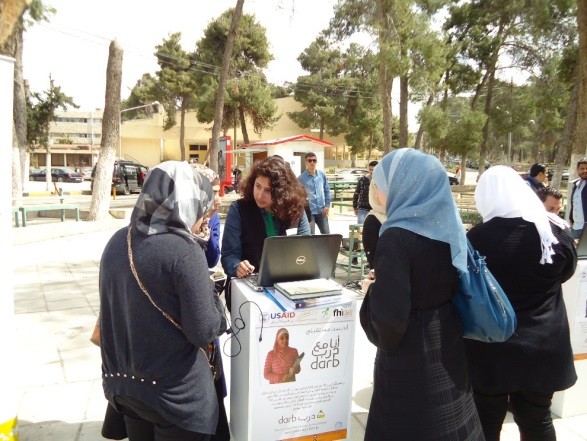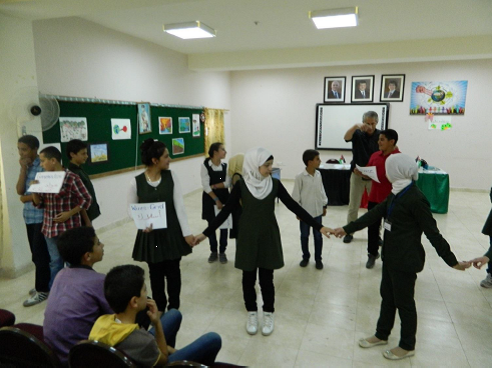BACKGROUND
In recent years, civil society in Jordan has evolved in unexpected ways. For example, Civil Society Organizations (CSOs) have had exponential growth from 1,500 registered CSOs in 2008 to more than 4,922 in 2015. Also, there have been disparate efforts to engage in advocacy and social change on issues ranging from access to information, community engagement, elections, and disability rights to increases in service provision to cope with the impact of the Syrian refugee crisis. Furthermore, youth and women are mobilizing themselves at the local and national levels. All in all Jordan is growing as a civic-minded country.
Despite this, civil society faces internal and external challenges. Most CSOs remain reactive; they respond to donor priorities with few developing their own long-term strategic plans in support of their mission. Most groups are volunteer-based and lack institutional capacities and structured systems to measure the impact of their work and to ensure effective program management and growth. Coalition-building and collaborative action remain sporadic with few CSOs joining forces to advance their issues. In addition, policy-level changes are needed to provide a more enabling environment for civil society to thrive. Something must be done to bridge the gap between what CSOs want to do for their country and what they have the necessary background and support to achieve.
PROJECT OVERVIEW

The USAID Civic Initiatives Support Program (USAID CIS) aims at cultivating a strong and vibrant civil society in Jordan through supporting a broad range of civic initiatives. Working at both national and local levels, it supports civic initiatives and advocacy responding to common interests; strengthens the organizational capacity of civil society organizations; and promotes Government of Jordan-civil society collaboration efforts to address reform and development challenges. Launched in October 2013, this program builds on USAID’s five-year commitment through the Jordan Civil Society Program.
In line with USAID’s Country Development Cooperation Strategy (CDCS), CIS is meant to be cross-cutting and support all of CDCS' objectives. It inclusively provides support to civil society actors working in the fields of democracy, human rights and governance, economic development, education, energy, environment, health, and/or water through:
- Sub-awards and technical assistance in support of Jordanian civic initiatives;
- Institutional strengthening and capacity building support to CSOs at all levels, including Jordanian intermediary support organizations;
- Targeted technical assistance to USAID implementing partner sub-award recipients from across the Mission’s portfolio of programs;
- Enhancing the capacities of Government of Jordan staff at the Registry of Societies and other relevant Ministries that engage with civil society;Funding for research on the civil society sector;
- Funding for research on the civil society sector; and
- Supporting opportunities for Government of Jordan-civil society dialogue.
ACTIVITIES
Within the past 26 months, USAID CIS has:

- Launched six open grant competitions that have reached a broad population of CSOs from all 12 governorates where more than 650 organizations more than 1,187 applications from more than 650 organizations;
- Managed a one-year open competition for grants in support of civic initiatives that address all CDCS themes with 57 awards issued to date totaling approximately $6 million and more awards forthcoming;
- Supported seven CSOs to advance rights under the Democracy, Rights, and Governance grant competition with anticipated follow-on support resulting in a total of $3.5 million in grants;
- Awarded 23 mini-grants for piloting creative and innovative approaches in engaging adolescents/youth, ages 12-18 years, and adult influencers such as teachers, community leaders, and parents to combat violence and social injustice at the community level with the goal to provide follow-on funding for scaling up projects, six of which have proceeded to Phase II;
- Issued a call for applications to support rights-based program interventions and inclusive quality service delivery to persons with disabilities at the national and local levels from which eight organizations have been shortlisted for awards
- Served a wide population of over 907 community-based organizations (CBOs) to introduce them to the fundamentals of sound institutional and program management through the Internal Strengthening for Change program (ISC) out of which 85 have proceeded with institutional development assessments from which 42 are now developing five-year strategic plans;
- Engaged leading Jordanian intermediary support organizations such as the Jordan River Foundation, the Noor Al Hussein Foundation, and Al Thoria Center for Studies to jointly design and implement the ISC technical assistance program;
- Conducted numerous capacity building opportunities for 282 CSOs and CBOs in four primary areas - project design and management, organizational management, advocacy and outreach, gender, and other technical topics;
- Implemented institutional capacity assessments for national level CSOs and CBOs;
- Coordinated with other USAID implementing partners to further enhance the capacities of their Jordanian sub-awardees through technical assistance, mentoring and training on advocacy, institutional strengthening, and monitoring and evaluation; and documentation & report writing basics;
- Provided technical assistance to the Registry of Societies which is the regulatory authority for civil society in Jordan, and the Higher Council for the Affairs of Persons with Disabilities;
- Designed a new two-year intervention – Societies Empowerment Fund - for emerging non-profits to reflect, develop, and strategize for the purpose of enhancing its organizational and technical effectiveness as well as allowing them to grow and sustain their programs.
EXPECTED OUTPUTS
USAID CIS will contribute to creating a better equipped and more engaged Jordanian civil society; one that plays a key role in advancing Jordan’s development goals and promoting democratic governance and prosperity.







Comment
Make a general inquiry or suggest an improvement.